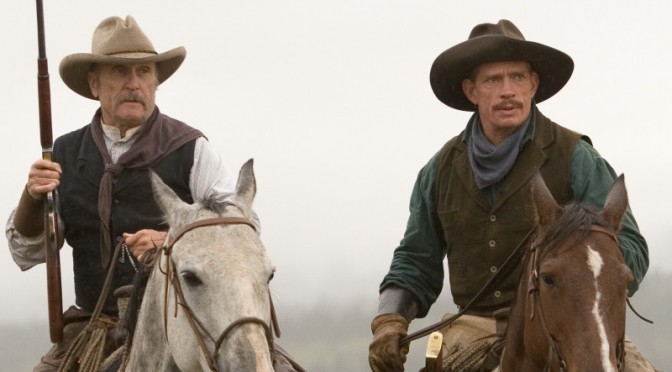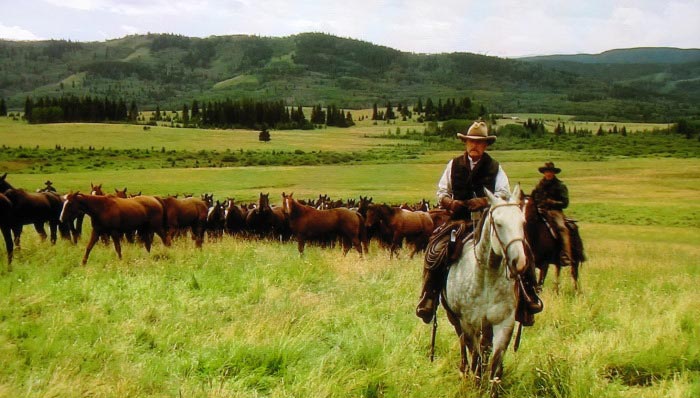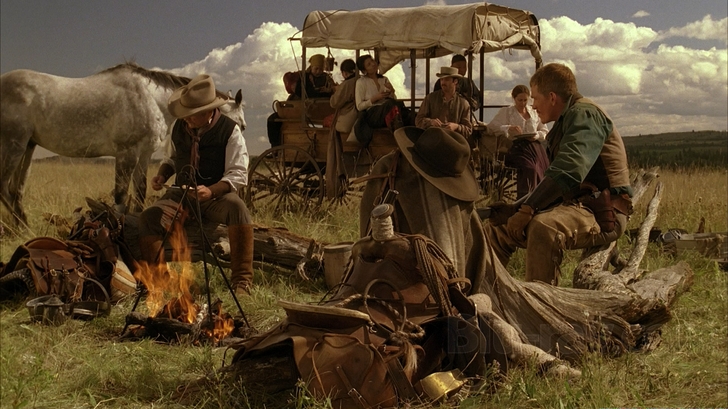This western was probably made before there even was a “manosphere,” but those of a neomasculine perspective should find it well worth watching.
The plot premise: A rancher and his nephew strike a deal to drive a herd of horses across many miles of open range in 1898, to sell to a rancher supplying the British Army. Along the way, they run into a sleazy human trafficker transporting a wagon load of beautiful Chinese girls to a whore house. (The girls had been sold to the trafficker by their own families in China.) The trafficker rustles their horses, and is dealt with the way horse thieves were actually dealt with in those times. This leaves Print Ritter (Robert Duvall) and Tom Harte (Thomas Haden Church) burdened with the care of the human cargo.
This film was produced as a two-part series (on AMC, I think). And it was released in this millenium. But hang onto yer hats, boys, ’cause the Chinese gals don’t turn out to be invincible Kung Fu masters who beat down the bad guys bare-handed. Nor are they “strong, independent” snowflakes who wind up as successful queens of their own cattle empires. In fact, there are only a couple points in the plot where The Narrative tries to slither into this pleasant surprise of a film–and it’s subdued enough to be overlooked. Time and again, the film makers fail to inject the current year “values” into this period piece–which makes it one big macroaggressive triggerfest.
And that’s refreshing enough all by itself.
Lo and behold, not all the villains are white male heterosexuals, either. But beyond superficial details, this cinematic tale cuts against the grain in other ways, too. There are lessons about frame, hypergamy, SMV (sexual market value) and other red pill concepts that manosphere mavens will appreciate.
Our cowboy heroes are not the illiterate, bigoted raaaaaayciss stereotypes you might expect any white male heterosexual character to be (prior to the sanctifying advent of feminism) yet neither do they turn into fawning beta white knights around the high-SMV women (in a time and place where such women were few and far between). They are men, and consistently behave as such with all parties encountered. They’ve got a job to do, and do their best to stay focussed on that despite mounting distractions.
The Chinese women recognize not only that the cowboys are honorable, but are effective protectors and providers. You might expect (after being innundated with current year propaganda) that after being sold into slavery, treated harshly, and witnessing the rape of one of their own, a movie womyn would be hell-bent on avoiding all men until some metrosexual current-year-sensibilitied white knight came along, recognized her for the special snowflake she is, and dedicated himself to serving her perpetually while offering heartfelt apologies for any and every misunderstanding which may or may not be his fault. Yet, when the cowboys try to hand these women off so they can get back to their job, the women freak out in protest. They know a good deal when they see one, and need good men to protect them in this “savage land.”
The wild West wasn’t quite as savage as the inner cities in the current year welfare state, but I digress.
All my use of neomasculine terms to analyze this film is not, however, meant to imply that the heroes are PUAs (“pick up artists”) who use “game” to make themselves attractive to the girls. They maintain “frame,” for sure, but naturally–not as some learned technique to artificially boost SMV. Truth is, these are cowboys living before the culture became an over-sexualized idiocracy with ubiquitous entertainment mediums. The male-to-female ratio was abysmal in the old West, and most men had resigned themselves to being lifelong bachelors, or knew they would have to acquire significant resources before they could hope to attract wife material (and the culture didn’t encourage people to sleep around as it does now, either, so alpha PUAs in those times were not well regarded by society at all). In other words, the cowboys were not sex-obsessed, and the language/cultural barrier would have given them pause in this situation, however attracted they were to these damsels-in-distress.
There’s a lot more to appreciate about this film than just the socio-sexual dynamics. You should check it out.



